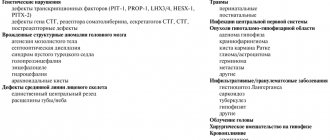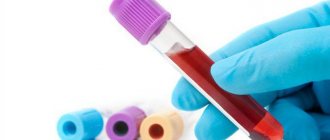The thyroid gland is the most important organ of internal secretion, controlling almost all processes. It produces several vital hormones that ensure the normal functioning of the entire body. According to official statistics from the World Health Organization, about 3% of the population suffers from thyroid diseases. This is due to various reasons: concomitant pathologies, genetic predisposition, living in an iodine-deficient area, etc. Therefore, it is important to periodically check thyroid-stimulating hormone, as this will help to promptly identify deviations in the hormonal balance and begin effective drug treatment.
Why is TSH analysis necessary?
The TSH level is an important diagnostic indicator that allows us to judge the functioning of the thyroid gland. This hormone is secreted by the pituitary gland and affects the production of T3 and T4 (they play an important role in growth, intellectual and physical development, energy reserves, fat and protein metabolism). TSH is responsible for regulating the processes of iodine delivery to the thyroid gland and enhancing lipolysis. T3 and T4 have a significant impact on the functioning of the internal systems of the body. In addition to metabolic processes, they control cardiovascular activity, digestion, reproductive function and even mental health. TSH, T3 and T4 are closely related to each other, so in medical practice they are studied simultaneously. The concentration of the latter hormones is inversely proportional to the TSH content: as soon as a sufficient amount of T3 and T4 appears in the body, the release of TSH stops and vice versa.
Testing for the hormone TSH is most often prescribed for:
- Hypothyroidism and goiter.
- Infertility and other disorders of the reproductive system.
- Undergoing hormone replacement therapy.
- Impaired cardiovascular activity.
- Myopathy.
- Menstrual disorder.
- Psychological disorders.
- Delayed sexual and intellectual development in childhood.
Impaired TSH synthesis can occur for several reasons, including:
- Traumatic brain injuries, large blood loss, damage to the hypothalamic-pituitary system (neoplasms, hemorrhages).
- Pituitary tumors (both benign and malignant), which increase the synthesis of hormones. As a result, active and uncontrolled hormonal production occurs, leading to hypothyroidism, diabetes, infertility, etc.
- Damage to other endocrine glands, including neoplasms or adrenal insufficiency.
- Insufficiency of the hypothalamic-pituitary system. It may occur against the background of infection (meningitis), poisoning with toxic substances, autoimmune pathologies or brain surgery.
- Hemorrhagic stroke (in this case, endocrine disorders fade into the background, since cerebral symptoms predominate).
- The concentration of TSH in women may change due to complications during childbirth or abortion during pregnancy (described in more detail below). Therefore, TSH during pregnancy is always performed in the 1st trimester.
Why is a blood test for the hormone TSH performed?
A doctor may order a patient to take a thyroid-stimulating hormone blood test in the following situations.
- The need to check the condition of the thyroid gland, suspicion of the development of diseases associated with this organ in a person.
- The need for control over the treatment of thyroid diseases.
- To identify female infertility and select the optimal treatment method for this problem.
A blood test for the hormone TSH can be prescribed by a gynecologist or endocrinologist.
Preparation for the procedure
It is extremely important to know how to take a TSH test , since taking preparatory measures will allow you to obtain the most reliable data. Preparation includes:
- 3 days before blood sampling, you need to give up alcoholic beverages, smoking, playing sports, and refrain from stress and temperature changes.
- Stop drug therapy (if possible and approved by your doctor).
- Before the procedure, do not have breakfast, maximum - a glass of still water. It is recommended to refrain from eating any food 12 hours before the test.
How to prepare for the analysis?
Before testing for TSH, it is very important to prepare properly, otherwise the results will be distorted. On the eve of the study, it is recommended to stop taking medications and vitamin preparations that contain iodine. If for some reason this cannot be done, you should notify your doctor.
Preparation for the test begins 3 days in advance:
- refusal of alcohol, fatty, spicy, fried foods, sweet carbonated drinks;
- reduction of psycho-emotional stress;
- smoking restrictions;
- abstaining from excessive physical activity.
The day before you need to have dinner no later than 20:00.
Blood for TSH is donated on an empty stomach, and also before performing the following manipulations:
- massage;
- intravenous and intramuscular infusions;
- ultrasonography;
- fluoroscopy;
- physiotherapy.
Important! Women should remember that the reliability of the test results depends on the phase of the menstrual cycle. Experts recommend conducting the study from days 5 to 8 of the cycle.
How the research is carried out
Taking a TSH test is a universal procedure that does not require special medical instruments or equipment. It is carried out in all clinical laboratories (both paid and public). It is recommended to donate blood in the morning (from 8 to 11 am). The TSH concentration is determined using a chemiluminescent immunoassay on microparticles, which has a high level of accuracy. For this purpose, blood serum obtained from the patient’s vein is used. The procedure itself does not cause severe pain, but may be accompanied by minor discomfort. As a rule, you can get results within 1-2 business days. It is important to understand that the patient receives exclusively diagnostic data, without interpretation and diagnosis. This is done exclusively by the attending physician. If the TSH test is normal , then WHO recommends conducting the next examination no earlier than in a year. If there are problems with the thyroid gland, the frequency of the procedure should be increased to 2 times a year. You can get a TSH test at the medart clinic.
What can affect the results of a TSH test?
The level of the TSH hormone can vary due to the influence of various external or internal factors on the body. This is especially true for the time of day. The maximum concentration is observed at night (from 2 to 4 am and from 6 to 8 am), and the minimum is from 5 to 7 pm. In the absence of proper sleep at night, hormonal synthesis is disrupted. In addition, a decrease in TSH can become a symptom of pregnancy and breastfeeding, which is regarded as a variant of the norm. Some medications may also cause changes in TSH concentrations. The thyroid gland is closely related to other internal organs, so disruption of their functioning significantly affects hormonal production. In middle-aged women and elderly men, the maximum value of thyroid-stimulating hormone is detected in December. During menopause, an increase in TSH is allowed in the absence of signs of an increase in the size of the thyroid gland.
What does a decrease in TSH norm mean?
If the interpretation of test results for the hormone TSH
shows results that are below normal, the patient may assume the following problems and diseases:
- hyperthyroidism in pregnancy;
- thyrotoxic adenoma (also called Plummer's disease);
- diffuse toxic goiter;
- autoimmune thyroiditis with signs of thyrotoxicosis;
- TSH-independent thyrotoxicosis;
- cachexia;
- mental illnesses, disorders.
Thyroid-stimulating hormone: normal
Normal TSH directly depends on the person’s age. For each age period, this value has different indicators, which is noticeably visible in the first months after birth. Reference values are:
| Age | TSH level, honey/liter |
| 4 days - half a year | 0,73–4,77 |
| half a year - 14 years | 0,7–4,17 |
| 14–19 years old | 0,47–3,41 |
| Over 19 years old | 0,4–4,0 |
As can be seen from the table, changes in normal TSH levels vary throughout life. Therefore, only a medical professional must make a conclusion based on the results of the analysis, comparing them with the norm. When deciphering, the endocrinologist can also take into account the characteristics of each organism, gender (according to statistics, women develop thyroid problems 2 times more often than men), a history of diseases, medications taken, and much more.
Interpretation of tests and pregnancy
The level of concentration of thyroid-stimulating hormone in the female body may change due to pregnancy, which must be taken into account when interpreting the results of a blood test for TSH.
- Normal TSH levels before the 12th week of pregnancy are 0.35 – 2.5 µIU/ml.
- The level of this substance in the blood of a pregnant woman at 12-24 weeks of pregnancy is in the range of 0.35 - 3 µIU/ml.
- At 24-42 weeks of pregnancy the indicators are similar – 0.35 – 3 µIU/ml. During this period, it is also possible that the results will be slightly higher than normal.
Decoding
An increase in TSH concentration in the blood may indicate:
- Primary hypothyroidism , even in the absence of clinical symptoms. But, as medical practice shows, a detailed questioning of a person often reveals the inability to engage in physical activity for a long time, rapid fatigue, loss of strength, unstable psycho-emotional state, tendency to depression, memory impairment, dry skin, brittle hair.
- Subacute thyroiditis is an inflammation of the thyroid gland. With this disease, organ tissue is damaged due to infection of the upper respiratory tract. The patient experiences pain in the thyroid gland and an increase in its size, myalgia and the inability to engage in physical activity for a long time.
- The presence of a tumor that promotes uncontrolled hormone production. Often occurs during an oncological process localized in the thyroid gland, lungs and mammary gland, as well as with pituitary adenoma.
- Resistance to thyroid hormones.
- Therapy with certain groups of medications , which as a side effect can increase the production of TSH.
A decrease in normal TSH values may occur due to:
- Damage to the thyroid gland.
- Itsenko-Cushing syndrome (develops when the adrenal glands are damaged, as a result of which the synthesis of cortisol increases and the TSH value decreases).
- Severe traumatic brain injuries.
- Hemorrhagic stroke in the pituitary gland or hypothalamus.
When is a TSH test needed?
An analysis to determine TSH norms is needed in the following cases:
• Suspicion of hypofunction of the thyroid gland - lethargy, drowsiness, dry skin, constipation, chilliness, etc. An examination can help understand the cause of decreased function (to distinguish pathology of the thyroid gland from pathology of the pituitary gland);
• Suspicion of hyperfunction of the thyroid gland – a feeling of arrhythmia and tachycardia, diarrhea, nervousness, insomnia, menstrual irregularities, feeling of heat, weight loss, protrusion of the eyeballs from the orbits, etc.;
• Monitoring the results of treatment after removal of the thyroid gland (partial or complete);
• Monitoring the results of hormone replacement therapy for glandular diseases;
• Autoimmune diseases of the thyroid gland and control of their treatment;
• Diagnosis of suspected congenital hypothyroidism in a newborn.
TSH during pregnancy
Human chorionic gonadotropin has a similar molecular structure to thyroid-stimulating hormone, which determines the activation of the thyroid gland. In the 1st trimester, the concentration of thyroid hormones increases, and TSH decreases. Subsequently, thyrotropin levels return to normal. Therefore, the TSH norm strongly depends on the trimester and should be determined exclusively by the attending physician.
| Term | TSH level, honey/liter |
| First trimester | 0,15 — 2,45 |
| Second trimester | 0,18 — 3,2 |
| Third trimester | 0,29 — 3,5 |
A slight deviation from normal values (no more than 5 mU/liter) may develop as a consequence of psycho-emotional stress experienced by a pregnant woman. A persistently elevated TSH concentration during pregnancy may be a sign of the following conditions:
- Inflammation in the thyroid gland.
- Severe gestosis.
- Neoplasms in the organs of the endocrine system.
- Pituitary adenoma.
- Hypothyroidism.
- Adrenal insufficiency.
- Serious diseases of internal organs, etc.
If a low TSH level during pregnancy is detected in the 1st trimester, then the woman need not worry. This change may be caused by the appearance of signs of toxicosis, often manifested as nausea and vomiting. Normal hormonal levels appear only in the second trimester, when symptoms of toxicosis subside.
The danger is a decrease in thyroid-stimulating hormone due to damage to the endocrine system. Therefore, it is extremely important to regularly monitor hormonal levels and, if even small deviations are detected, seek medical help. Lack of timely medical intervention can lead to miscarriage, premature birth, gestosis, fetal hypoxia, and delayed growth and development of the child.
What does an elevated TSH mean?
If the indicators obtained as a result of a blood test for TSH
, exceed the norm, this may indicate that the patient has serious illnesses. The concentration of thyroid-stimulating hormone may increase in the following cases:
- pituitary tumor (for example, basophilic adenoma, thyrotropinoma);
- primary, secondary hypothyroidism;
- syndrome of unregulated secretion of the hormone TSH;
- Hashimoto's thyroiditis;
- adrenal insufficiency;
- lead poisoning;
- preeclampsia;
- thyrotropin-secreting lung tumors
- mental disorders, diseases.
It must also be remembered that the TSH
in the body may increase in the
test
results if the patient takes the following drugs as part of treatment: rifampicin, diphenin, methimazole, iodides, furosemides, metoclopramide, aminoglutethimide, benserazide, phenothiazine derivatives, morphine, prednisolone, calcitonin, as well as amiodarone, propranolone, valproic acid , metoprolol, motilium, clomiphene, atenolol and phenytoin.





